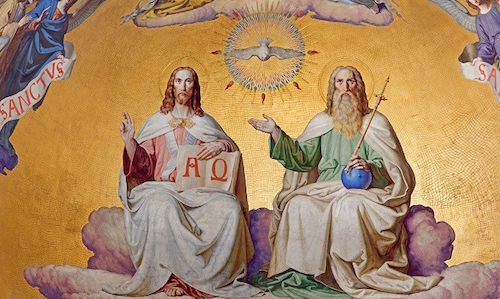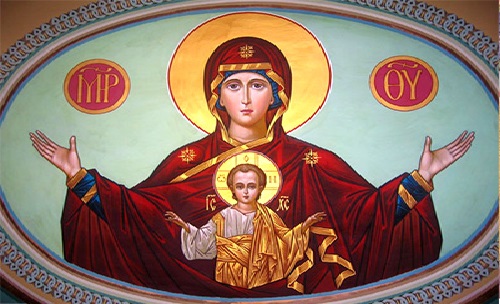
A List of Things & Persons that “Preexisted.”
January 31, 2018
Are There Any Trinitarians to be found in the NT? Part 3
March 1, 2018Begotten In or Outside the Womb?

The Gospels continuously refer to Jesus as God’s monogenes huios, “only-begotten[1] son,” i.e., “the Son of God.” The whole of the 1st century apostolic faith can indeed be summed up by that confession: John 20.31; cp. Mat 16.16.
The Greek is typically rendered as “begotten,” a now rarely used, antiquated word that simply means to procreate. This is because the root, gennao, means “to cause something to come into existence, primarily through procreation.”[2] So it makes sense for Matthew [1.18] and Luke [1.35] to similarly describe the virgin birth as a miraculous “origin,” “coming into existence” of God’s Son.
This all-important early Jewish-Christian understanding/confession of faith quickly devolved when the Son became “God the Son,” whose original procreation could not possibly have been in time, in the womb of a young virgin Jewish girl.
2nd century:
Ignatius, 1 Ep 7.2:
“There is one only physician, of flesh and of spirit, begotten and unbegotten…Son of Mary and Son of God, first passible and then impassible…”
1 Ep 18.2: “For our God, Jesus the Christ was conceived in the womb by Mary…”
3rd century AD.
Tertullian, On the Flesh:
“God therefore sent down into the virgin’s womb His Word…”
Against Praxeas 2: “The one only God has also a Son, His Word [who] we believe to have been sent by the Father into the Virgin….both Man and God, the Son of Man and the Son of God…”
Malchion Epistle against Paul of Samosata 6, 171:
God “was in the womb, united essentially with the human…his substance being wedded with the man.”
Peter of Alexandria, In Deitate, 6, 280-83:
“Now God the Word…by the will of God…was made flesh in the womb of the virgin…”
4th century.
Lactiantius, Divine Inst. 4.12:
“the Holy Spirit, descending from heaven, chose the holy Virgin that He might enter into her womb.”
Unknown, A Poem on the Passion of the Lord:
“It was on account of you and your life that I entered the Virgin’s womb, was made man, and suffered a dreadful death.”
Augustine, Letter 137:
“That very greatness of His power….took to itself a rational soul and thereby also a human body.”
Hilary of Poitiers, On the Trinity, 2.25-26:
“The One Only-begotten God, ineffably born of God, entered the Virgin’s womb [quotes Luke 1:35 as proof]. The Holy Ghost, descending from above, hallowed the Virgin’s womb [and] mingled Himself with the fleshly nature of man…”
5th century.
St. Theodosius the Cenobiarch, Homily 4, 6:
“The Divine Virgin Mother….received the living God, the Word, into her virginal and fragrant bridal chamber.”
Saint Proclus, Homily 3:
“When the holy Virgin offered her womb, the Word rushed in through her sense of hearing…the Most High emptied himself, taking the form of a slave and finally, the Virgin’s womb carried the mystery of the divine economy. O womb wider than the heavens! O womb, who were the bridal chamber of the clay and the potter!”
Ephrem/Ephraimthe Syrian, Epiphany Hymns 8.1; 10:
“God in His mercy stooped and came down [and] dwelt in the womb.”
Hymns on the Nativity 4, 182:
“How did the womb of Mary sustain Him? Who’s able to speak about the hidden Son Who came down and put on a body in the womb?”
John Chrysostom, Homily on “Father, if it be possible…”
“This God who surpasses all understanding [lowered Himself] to become man and to take flesh….noiselessly and gently entered into the Virgin’s womb.”
Homily 4 on First Corinthians:
“Thus, should we set about convincing men by reasonings, how God became man, and entered into the Virgin’s womb…”
Sedulius, Carmen 2, 35-40:
“the Word became flesh….the most-high Infant, conserving intact the womb of his temple.”
Romanosthe Melodist, On the Person of Christ:
I “came down from heaven, like the manna, not onto Mount Sinai, but into your womb. For within it, as David prophesied, I was curdled like cheese.”
Pope Gregory the Great, Registrum Epistolarum Book XI, Letter 67:
“As soon as the Word came into the womb, immediately…was made flesh. And the Only-begotten Son of God, through the womb of the Virgin, was born a perfect man”
Leo the Great, Letter 21:
“He who is the Word of God came down from heaven without flesh and was made flesh in the holy Virgin’s womb unchangeably and unalterably…”
Council of Ephesus, A.D. 431:
“Taking flesh of the Holy Virgin, and having made it his own from the womb, he subjected himself to birth for us….but although he assumed flesh and blood, he remained what he was, God in essence and in truth.”
6th century.
Pope Pelagius I Letter to King Childbert I:
“The Son of God in these last days descended from heaven [and] mercifully entered the womb of the same holy Virgin Mary….as it is written, ‘wisdom built herself a house’.”
9th century.
Aelfric, Abbot of Eynsham, Homilies, The Annunciation of St. Mary:
She said to the angel “Let it be as you say, that the Son of the Almighty God enter my womb and receive human substance from me…” And she believed the angel’s announcement, and so with faith received God into her womb.
NOTE these early “Church Fathers” also accused so-called “heretics, Gnostics” of describing the virgin birth with the very same Incarnation language Catholic-Protestant creeds would later adopt!!
“There are also some who maintain that he also produced Christ as his own proper son….This Christ passed through Mary just as water flows through a tube.” Irenaeus, Ag. Her. 1.7.
“And these heretics [the Sethians] affirm that the Son, [the perfect Logos] underwent a transformation, and in the shape of a serpent entered into a womb…” Refutation of All Heresies, Hippolytus, 10.7.

